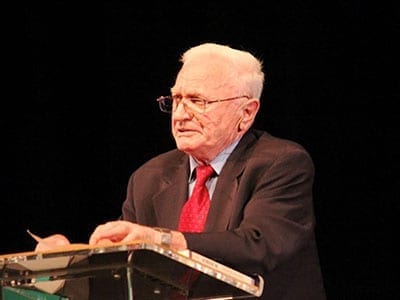
THOMAS ‘TOIVI’ BLATT
Escape from Sobibor: A Survivor’s Story
Thomas Blatt was born on April 15, 1927 in Izbica, Poland, a small Jewish town in the Lublin district of Poland with a population of about 3,500. Thomas was the older of two boys, his mother, Felecia, was a homemaker, and his father, Leon, operated a liquor store. Until the German invasion of Poland in September 1939, Thomas and his brother, Hersz, led the rural life of a ‘shtetl’ (small town) Jew, content and happy in their Jewish community.
After the German invasion, Thomas’s life became an unending struggle to survive the persecution and brutalities of the Nazis and their Polish collaborators. Thomas’s ordeal is described in horrifying detail in his personal story published in 1997: From the Ashes of Sobibor. Initially Thomas and his family learned to avoid deportation by hiding during the routine roundups of Jews in Izbica.
When it became evident the Nazis planned to eliminate all the Jews from Poland, the family purchased falsified Aryan papers for Thomas in hopes that he might escape to Hungary and eventual safety. Despite having Aryan features and the falsified papers, Thomas was arrested on the train and imprisoned in the town of Stryj in Poland. Sensing the danger of remaining in the town jail, Thomas faked the symptoms of typhus in order to be transferred to the ward with other typhus prisoners. Although this deception probably saved his life, upon admission to the hospital Thomas was placed on the ward with other typhus patients. Within days Thomas contracted typhus and almost died from the disease.
After recovering from his bout with typhus, Thomas successfully contacted his parents back home and his father sent a trusted friend to bring Thomas back home to Izbica. The joy of being reunited with his family was short-lived as the Nazis stepped up their deportations of Jews and the Blatt family lived in fear of their lives. Then the inevitable happened, the Nazis captured the entire Blatt family and deported them along with the last remaining Jews of Izbica for ‘relocation’. The railcars loaded with human cargo of Jews from Izbica went directly to the death camp at Sobibor.
Upon arrival at Sobibor, on April 28, 1943, Thomas’s parents and younger brother were immediately sent to the gas chamber and Thomas was selected for a work detail to process future arrivals of Jews from throughout Europe. By being chosen for work, Thomas was granted a brief respite from certain death. For among the Jews at Sobibor it was known that there was no way out of Sobibor except “through the chimney with the wind.”
However, the fate of the Jewish labor force at Sobibor was not to be determined by the Nazi’s extermination plans, but rather the Jews themselves. Emboldened by news of the Warsaw ghetto uprising and determined to defy the Nazis, the Jews of Sobibor devised a plan to overpower their Nazi tormentors and allow for the escape of all 600 prisoners. On October 14, 1943 the Jews of Sobibor killed the camp’s Nazi SS officers and led an escape from the camp. Of the 600 prisoners, 300 were killed in the attempt but the remaining prisoners made it successfully into the woods and evaded capture. The Escape from Sobibor was the largest and most successful concentration camp uprising of the war. Upon hearing of the escape, Heinrich Himmler, head of the Nazi SS, closed the camp within days, destroyed all evidence of the camp, and planted the area over with trees.
With 18 months of the war remaining, freedom was far from guaranteed for the escapees. By the war’s end only 47 survived to see the end of the Nazi reign of terror; Thomas was one of those lucky ones. After the war, Thomas settled in Poland until he traveled to Israel in 1957. There he met an American tourist named Dena and one year later they married. In 1959 Thomas immigrated to the United States with his new wife and settled in California, where he started a successful electronics company and raised two children, Lenny, named for his father, and Rena. Thomas is now retired, lives with his daughter Rena in Santa Barbara, and enjoys the company of his two granddaughters.
